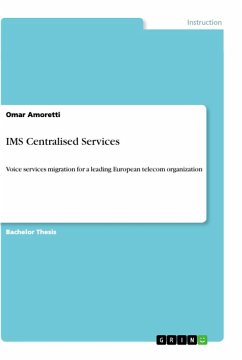Bachelor Thesis from the year 2013 in the subject Instructor Plans: Computing / Data Processing / IT / Telecommunication, grade: 1,0, University of Applied Sciences Technikum Vienna (Electronic Engineering), language: English, abstract: This bachelor thesis aims at providing an overview of the evolution process from the current circuit-switched (CS) voice services to those based on the IP multimedia subsystem (IMS). The timeline in question comprises the years 2013 to 2018 and takes into consideration three possible scenarios: one intermediate state and two target states, each of them presenting a particular setting in respect to the CS & IP domain mediation. Those states are subsequently evaluated according to certain predefined criteria. In addition, a complementary framework is given by the SWOT analysis which will consequently lead to the final recommendations for one of the leading European telecom organizations (the company in question is not disclosed throughout this thesis on purpose). Within this context, the major characteristics of the Austrian as well as European mobile markets are examined. Finally, the expected key assumptions and developments for the given timeframe are presented together with the particular findings of the topics previously described.As a starting point, the basic IMS architecture is presented together with its major features in respect to other current technologies. In a further step and based on the previous information, the key motivations for the transition from CS to IMS-based voice services will be discussed. In this sense, a service consistency delivered by centralized services on an access agnostic basis is assumed.For this purpose the initial state is evaluated regarding its three relevant levels: the transport/endpoint, session/control and application/service layers. Next, a more comprehensive approach, the intermediate state, is evaluated: here, the legacy SCP supports the CS&IP domain mediation via the IM-SSF.Moreover, two other target states are assessed involving the SIP AS using a reverse IM-SSF and the L2 interface respectively. Having highlighted the significant characteristics of each (future) state, attention is then drawn on the various criteria for IMS-based voice services such as roaming, handset capabilities and the like. Hence, a SWOT analysis is presented addressing the question 'Is the deployment of the intermediate state from a technical and economic perspective recommendable? Finally, the major mobile market characteristics in Europe as well as the expected developments for the timeframe 2013 - 2018 will be described. Furthermore, the concluding recommendations are derived from the key findings throughout this thesis.
Hinweis: Dieser Artikel kann nur an eine deutsche Lieferadresse ausgeliefert werden.
Hinweis: Dieser Artikel kann nur an eine deutsche Lieferadresse ausgeliefert werden.








